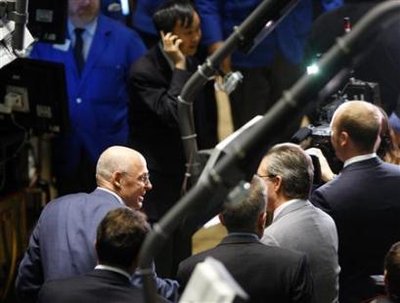US Treasury Secretary Henry Paulson on Tuesday praised China's cooperation in taming global financial turmoil and urged the next US president to continue an active economic dialogue with Beijing.
 |
|
Treasury Secretary Henry Paulson (L) is greeted by traders on the floor of the New York Stock Exchange October 21, 2008. [Agencies]? |
In his first major speech on China in two months, Paulson said he has held useful and constructive discussions with Chinese Vice Premier Wang Qishan on the turmoil rocking global markets.
"It is clear that China accepts its responsibility as a major world economy that will work with the United States and other partners to ensure global economic stability," Paulson said in prepared remarks to the National Committee on US-China Relations in New York.
A advance copy of his remarks were released in Washington.
Paulson said the United States has demonstrated that it will "do what is necessary" to strengthen financial institutions, unlock credit markets and minimize the impact of financial instability on the broader US economy. He urged other governments to do the same.
China is feeling strains from the global turmoil as well, but was expected to continue to be an important engine for global growth, Paulson said.
The next US president should recognize this and engage China as a growth opportunity for US companies, consumers, exporters and investors, he said. "A stable prosperous and peaceful China is in the best interest of the Chinese people, the American people and the rest of the world," he said.
Paulson said he hopes whomever wins the November 4 election will build upon progress that Washington and Beijing have made during the past two years by holding high-level talks called the Strategic Economic Dialogue (SED).
"Perhaps most importantly, the SED has established a new model for communication, enabling us to address urgent issues such as turmoil in our financial markets, energy security and climate change," he said. "I hope that the next US president will expand on the SED to take US-Chinese relations to the next level."
Before the credit crisis forced him to prop up faltering US financial institutions, Paulson had made US-China economic relations the centerpiece of his two-and-a-half-year term.
The former Goldman Sachs chief has made more than 75 trips to China during his career and launched the dialogue talks to try to tackle thorny issues such as America's ballooning trade deficit with China and what many US firms and lawmakers viewed as an undervalued yuan.
While the talks mainly have produced agreements on air services, product safety and energy and environmental cooperation, they have coincided with a gradual rise in the value of the yuan against the dollar.
Paulson said the talks have been an "excellent forum" for discussing the yuan's value, but he refrained from urging that Beijing allow faster appreciation. "I am pleased that China has appreciated the RMB by over 20 percent since July of 2005," he said.
Paulson also urged China to continue with financial sector and capital markets reform despite the global turmoil that has shaken US financial institutions to their foundations.
"Some in China look at the recent failures in our financial markets and conclude that they should slow down their reforms," Paulson said. "But there is a great opportunity for China to learn from our significant mistakes and move forward with reforms that have the potential to produce important gains for China and its people."
He said these include helping to rebalance China's growth to improve living standards for Chinese households, helping to allow monetary policy to tame inflation and encourage market-driven innovation.
(Agencies via China Daily October 22, 2008)